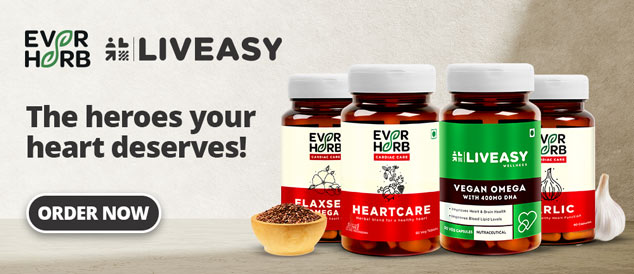Eating For A Healthy Heart – What You Need To Know
By Dr. Nikita Toshi +2 more

Get,

to manage your symptom
Get your,


4 Cr+ families
benefitted

OTP sent to 9988776655



You’ve successfully subscribed to receive
doctor-approved tips on
Whatsapp

Get ready to feel your best.

Hi There,



Register to Avail the Offer
Send OTPBy continuing, you agree with our Privacy Policy and Terms and Conditions

Hi There,

Trusted by 4 crore+ families

OTP sent to 9988776655



You have unlocked 25% off on medicines




Code: NU25

By Dr. Nikita Toshi +2 more
We lead a fast-paced lifestyle where nutrition and health management can sometimes take a backseat.

We could all benefit from someone who helps us analyze our overall health and customize a diet chart to suit specific nutritional requirements based on age, height, weight and any prevalent health ailments. 6meal does just that! Conceptualized and co-founded by Sonal Arora and Priyanka Chopra, it helps individuals reconsider the concept of a healthy meal and helps them design a diet chart that improves their health.
”Reading labels and ingredients is very important to be aware of what you are about to eat.”
Sonal Arora established 6meal post a brief encounter with a diabetic which motivated her and Priyanka to help people manage their health and lifestyle. Today, people are becoming more and more cautious and investing time in scanning and reading labels in order to learn about the products they consume. It is a good habit to inculcate learning about top ingredients or allergens in your food, especially packaged goods.
Read on to know how to manage the heart and lead a healthy life with expert Sonal Arora who believes meals are more important than medication.
Table of Contents
A healthy lifestyle starts with good and healthy eating habits. There are many causes that may affect your heart health you cannot just eat anything and expect to be healthy. Irrespective of what ailment you suffer from, a balanced and healthy diet coupled with physical exercise is definitely a fool-proof way to manage and monitor it. Heart Patients need to make sure that the products they consume have no saturated or trans-fat. The fresher they eat, the better it is for them and anybody who wants to maintain a healthy lifestyle.
Heart patients are advised to include a lot of fruits and vegetables in their diet. And the good news is, there are no restrictions when it comes to that. The colourful the plate, the better the meal for your health. Raw fruits and vegetables work even better. Let’s say if you’re consuming Palak in winters, with a bowl of dal and chapati, make sure you add some carrots and cucumbers to make your meal look more colourful and balanced.
”Whether you are a heart patient, have a family history of the ailment or not, not consuming a balanced diet will catch up with you eventually”

Also Read: Take Care of Your Heart: Foods To Avoid If You Have Heart Palpitations
Prevention is always better than cure. However, if you suffer from heart disease, you must be able to manage and control it with the right diet plan. While it is important that you stay clear of trans fats and saturated fats, a balanced diet is incomplete without the right dose of MUFA (Monounsaturated Fatty Acids), PUFA (Polyunsaturated Fatty Acids) and Omega3 Fatty Acids.
”Most of us have more of PUFA and less of MUFA in our diet. Make sure to have a good combination of both”
For heart patients, all fruits and vegetables are allowed and can be consumed in moderation. Staying far away from junk and processed food is a must. For non-vegetarians, lean meats are desirable. To stay heart-healthy, go for a Mediterranean Diet incorporating lots of fresh fruits and vegetables, whole grains, nuts, healthy oils. Taking small steps like replacing salt with Himalayan rock salt and herbs is also recommended.
”Combining 5 balanced meals with any form of physical exercise such as brisk walking will help you keep your heart health under control.”
Cooking food in oils like groundnut oil, sunflower oil, flaxseed oil, almond oil, rice bran oil, safflower oil, soya bean oil, and mustard seed oil, which contain the required amount of MUFA, PUFA without any traces of trans fat reduces the risk of heart diseases. Anything bought from the market must be zero trans fat as even WHO has re-enforced all FMCG companies to package goods with no trans fats. Omega 3 is extremely good for heart patients, which comes from fish like salmon and other oily fishes, flaxseeds, walnuts, chia seeds, etc. These are basically healthy fats and beneficial for your heart health.

”People with fluctuating blood pressure levels or with high BMI tend to have some form of cardiac ailment later in life.”
Since there is a lot of adulteration in oils, heart patients must opt for cold-pressed oil. You could choose from peanut oil, olive oil, coconut oil, and mustard oil as these are also easily available regionally. Saturated and Trans-fat is a complete no-no. People who generally have blood pressure problems, tend to form heart ailments in the future. If your BP fluctuates, it is recommended to go for a ”Stress Test” at least once a year.
Also Read: Digestive Biscuits: Unpacking the Nutritional Benefits and Misconceptions
Here are 12 Super Foods Recommended for Heart Patients
| Mustard oil instead of Olive oil
Millets Plums and Peaches Green Tea Oily Fish Pomegranate | Moringa
Flax seeds Turmeric Amla Himalaya pink salt |
We will leave you with these key heart management tips:
Also Read: Ozempic Foods to Avoid: An Integrated Care Approach for Better Health
Instead of waiting for a health ailment to strike, you can follow the regime of eating healthy and in small portions right from the beginning. Sticking to your diet plan and believing in it completely is essentially the first step in managing your heart health and blood sugar levels. Your overall health ultimately depends on what you eat and how you eat hence, you must make a conscious effort to eat healthily and stick to your diet plan diligently.
When it comes to heart patients, calorie calculation varies based on height, age, and weight. Overweight heart patients are recommended to reduce weight apart from maintaining a healthy lifestyle. Post heart attack recovery also requires modification in the present lifestyle to survive with a healthy heart. The key to eating healthy is consuming small portions, especially during dinner as your body has a decreased metabolic rate at night and you would not be able to burn all the calories you consumed. You can definitely manage your heart health and control your fluctuating sugar levels by eating healthy and inculcating one physical activity in your daily regime.
In addition to eating the right and balanced meals, try our new LivEasy products essential for a heathy heart!

Also Read: Experts Explain the Difference Between Heart Attack and Cardiac Arrest
Disclaimer: The information provided here is for educational/awareness purposes only and is not intended to be a substitute for medical treatment by a healthcare professional and should not be relied upon to diagnose or treat any medical condition. The reader should consult a registered medical practitioner to determine the appropriateness of the information and before consuming any medication. PharmEasy does not provide any guarantee or warranty (express or implied) regarding the accuracy, adequacy, completeness, legality, reliability or usefulness of the information; and disclaims any liability arising thereof.
Links and product recommendations in the information provided here are advertisements of third-party products available on the website. PharmEasy does not make any representation on the accuracy or suitability of such products/services. Advertisements do not influence the editorial decisions or content. The information in this blog is subject to change without notice. The authors and administrators reserve the right to modify, add, or remove content without notification. It is your responsibility to review this disclaimer regularly for any changes.
Comments